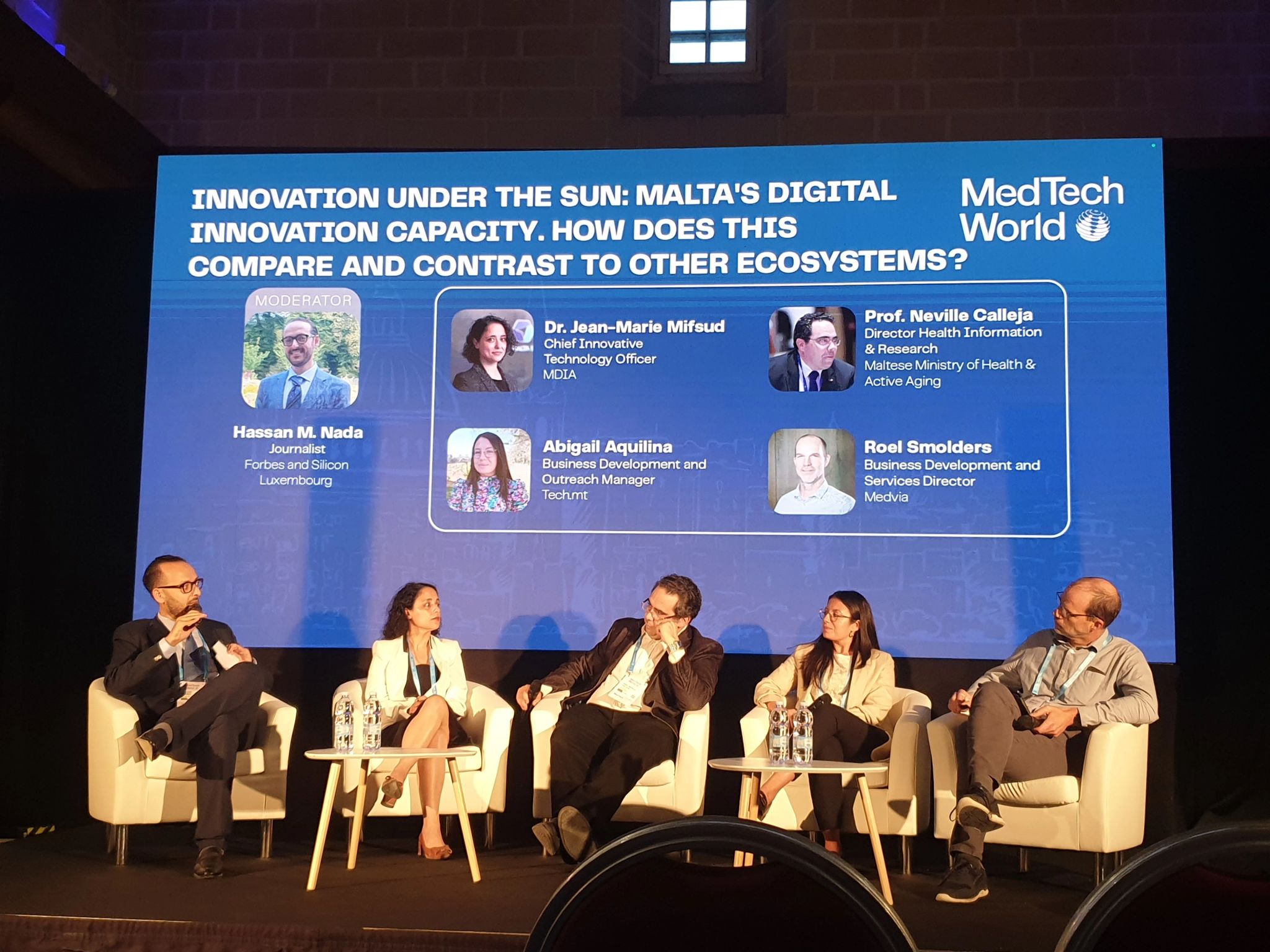
November’s Med Tech World 2024 conference saw experts, researchers, entrepreneurs and investors from across the globe join together to explore the intersection of health and technology.
Against a backdrop of sea and sun, Med Tech World 2024 showcased the future of healthcare, providing attendees with the chance to discover the health latest innovations and network with some of the most progressive in the field.
Discussions centred around patient empowerment, digital technologies, data management, investment strategy, fundraising, and much more.
Along with a cultural heritage tour for attendees, the event featured keynote speeches, live demos, a startup pitch competition and an awards ceremony, as well as investor-only and CEO-only discussions that provided exclusive insights on trends and strategy.
Discover insights from the three-day annual MedTech World conference.
It takes a village to build a startup
Founders thrive when they are supported by a network of investors, mentors, industry networks and other peers. This was the concept of the discussion panel It Takes A Village To Build A Startup, which explored what it takes to build a thriving community around a startup.
Speakers discussed their secret sauces for success, with Thomas Busby, Investment Banker of Outcome Capital explaining that, as an investment banker, you are exposed to many different startups, and might figure out what makes one startup stand out versus another.
“It’s in working with companies that you start to realise there’s no recipe for success,” explains Busby. “But there are certain suggestions that most companies should adhere to if they’re really trying to be successful in the market.
“The simplest recipe that I can give is that it starts with the market, then it goes to the technology, and it ends with the team.
“You need to identify a market that is open to new technologies with significant unmet needs.
“The world doesn’t need any more minimally innovative technologies in the world. They need to be able to be adopted by physicians that are going to use them without changing workflows. And finally, you need to have the right team of people in place to really carry the ball over the goal line.”
What do investors look for?
Discussing the crossover of investors and entrepreneurs the How We Do It panel explored key qualities that investors look for when looking for startups that have the potential for success.
Sanchita Pasi, Investor at EQT Life Sciences, explained that the health economics of a company is fundamental.
“What we mean by that is it has to improve clinical outcomes, which I think a lot of companies focus on very early on, because clinical validation is a first step to commercial adoption.
“There’s ways that we look at it differently based on the technology you have that would give us an idea of the commercial potential. We need to have clarity on commercial adoption. We have discussions on the ground and try to understand if there’s a need.
“I think it’s very common with many investors today, while it is about better helping patients, it’s also about the physician that’s going to adopt the technology and use it as well. So there’s a lot of usability diligence that we do on the physician level.
“If you look at the clinical results and the clinical trials that have been done, it gives an idea if it’s going to be adopted or not, if there’s actually patients for that technology.”
Empowering patients
Panels explored how harnessing the power of technology can help amplify patient voices and empower them in managing their own health.
Marina El Khawand, Founder at Medonations, discussed the benefits of decentralising efforts, sharing experiences from operating in Lebanon and expanding to multiple countries.
Registered NGO Medonations works to ensure patient access to high-quality medical care, working with partners to provide medical aid to vulnerable communities across Lebanon, helping over 20,000 patients to date.
“I started a mission with centralised efforts. I thought that centralising everything in one country, since I operate in Lebanon, would be more beneficial, and not growing into different countries and finding some sort of support,” said El Khawand.
“But I learned that decentralised efforts can make a difference, so we decentralised to more than 65 countries. Now, we will get medication and get data support from helpers living in 65 countries and continents.”
El Khawand also emphasised the importance of trust with companies to ensure patients have access to platforms and data support, along with the importance of patient empowerment and education in managing their own health.
The panellists explored the concept of patient empowerment, stressing the need for education and professional expertise, the importance of engaging experts and patients in decision-making processes, and the role of digital technology in enhancing patient communication and data management.
Innovation under the sun
A panel of experts also explored Malta’s innovation capacity and how this compares to other countries in the panel Innovation Under The Sun.
Taking questions from attendees the panel took a deep dive into digital transformation and innovation in Malta compared to other European ecosystems.
Dr. Jean-Marie Mifsud is the Chief Innovative Technology Officer (CITO) at the Malta Digital Innovation Authority (MDIA) commented: “Innovation relies heavily on the digital infrastructure, and one of the fundamental building blocks to enable digital innovation is telecommunication sector, and Malta boasts a very strong digital telecommunication infrastructure.
“We have three mobile network operators, and when you look at the report published by the European Commission, is very we in fact, have 100 per cent capacity coverage of very high capacity networks.
“That’s one aspect. But then there’s another aspect that we need to look into, which is not just the infrastructure, it’s the skills. Because it’s not just technology which is driving digital innovation is the humans that are driving digital innovations.
“If we look at humans, you have two aspects, you have the innovators, but you have also the users. So it’s important to make sure that you have both highly skilled human workforce, further development and decision of innovation.
“There is the room for improvement, and various public bodies are investing to support the digital literacy of our general public, even when it comes to supporting innovators and pilot and ensuring that we elevate our workforce, we are putting a lot of effort.
“In fact, the Malta Innovation Authority is one of those public bodies that is investing. We focus from young children organising smart summer schools and boot camps to introduce these young children as young as six year old, and also teenagers to digitally innovative aspects like AI, video editing, and robotics.
“But we also focus on the older people with for example, at MDA, we have a pathfinder digital scholarship grant that we support people who would like to pursue further education at masters and post graduate levels.
“So I think there are aspects which we are quite advanced, but then there’s still room for improvement, and we are making we are keeping a close eye on those indicators to make sure that we get there.”





